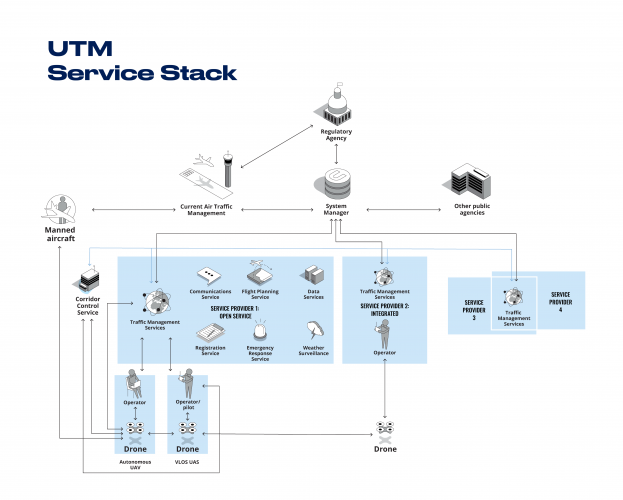Airbus UTM has published a sequel to its report looking at fairness in UTM released in February. In the latest paper entitled: Fairness in Decentralized Strategic Deconfliction in UTM, Airbus UTM reviews criteria used to determine strategic deconfliction as an enabler of safe operations for cooperative traffic. For example, the report examines first-come, first-served (FCFS) allocation of resources – already accepted in the aviation community and applied both tactically and strategically in air traffic management. It concludes it is unclear what the fairness implications are for a FCFS approach in a decentralized UTM architecture, dominated by on-demand operations that may not be scheduled in advance.
The report says fairness is quantified by comparing average ground delay across operators as well as calculating a normalized fairness metric that accounts for operator cost of delay. Two scenario types are simulated for a range of demand levels:
- Two package delivery operators serving a common region from separate warehouses, and with different constraints on when they can request UTM operations; and
- Two air taxi operators serving the same network of 7 vertiports, also with different constraints on when they can request UTM operations.
Among key findings, the report concludes that operators that are able to file ahead incur lower ground delays than operators that are not able to file ahead. Additionally, at low traffic levels, the operator filing ahead – by as little as eight minutes – sees delays comparable to when it is the only operator in the airspace. In contrast, the operator that is not filing ahead sees delays double what it would see when neither operator files ahead.
While delays are sufficiently low at low demand levels where these inequities may not be a concern; at higher demand levels, the trends are similar, but at much higher delay values for the operator not able to file ahead – approaching 2 hours in one simulated case. This is a major concern for on-demand operators dependent on trip time.
As expected, inequities are highest at high demand levels and high file ahead times.
As similar results are generated for the package delivery and air taxi scenarios, the report concludes that inequity under FRFS could be a concern for a range of operation types.
In summary – results indicate that for a decentralized FRFS approach to strategic deconfliction, based on when operators file their flight plans, there may be a significant imbalance in delays between operators based on how far in advance they are able to file ahead, and on traffic demand levels. To ensure fairness, at envisioned traffic densities, it may therefore be necessary to implement alternatives to the FRFS allocation.
For more information visit:
airbusutm.com/airspace-fairness




